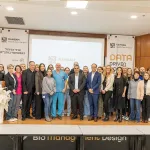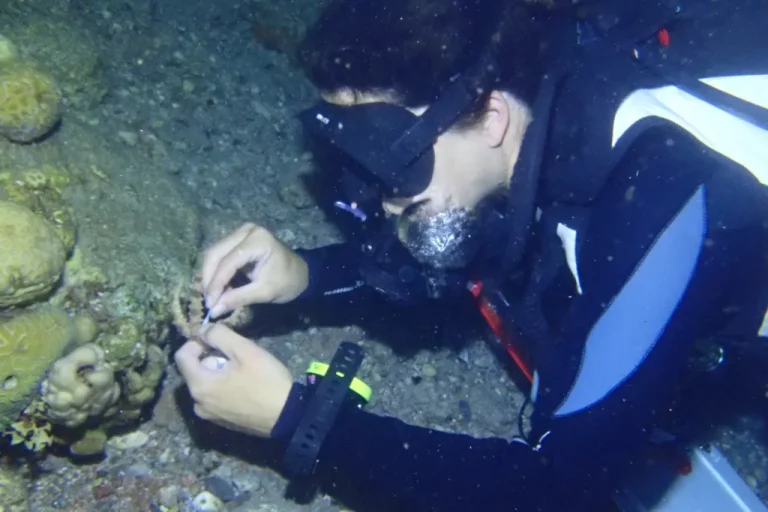Jerusalem, 16 November, 2025 (TPS-IL) — israeli scientists have identified the leading causes behind mass die-offs of sea urchins worldwide and developed a groundbreaking non-invasive tool to monitor marine life, Tel Aviv University announced. The findings reveal that pathogens, storms, and extreme temperatures are the primary drivers of these mass mortality events, while also introducing a new underwater genetic sampling method akin to a COVID-19 test.
Sea urchins play a vital role in maintaining the delicate balance of coral reef ecosystems by feeding on algae that compete with corals for sunlight. The sudden and rapid decline of these essential creatures poses a serious threat to reefs worldwide. Coral reefs serve as nurseries and habitats for countless marine species, providing shelter, food, and protection from predators. They also act as natural barriers, reducing coastal erosion and buffering shorelines against storm damage, while capturing carbon that would otherwise enter the atmosphere, helping to mitigate climate change.
These vital ecosystems already face significant pressures from rising sea temperatures, pollution, overfishing, and other human activities, putting their survival — and the species that depend on them — at increasing risk.
In a meta-analysis published in the peer-reviewed Biological Reviews, Dr. Omri Bronstein of Tel Aviv University and PhD student Lisa Schmidt reviewed 110 scientifically documented mass mortality events (MMEs) among sea urchins between 1888 and 2024. They found that pathogens were responsible for 33% of deaths, catastrophic events such as storms or oxygen depletion accounted for 25%, extreme temperatures 24%, algal blooms 11%, and human activity, including pollution and habitat destruction, 7%. Most reported events were concentrated in the Northern Hemisphere, particularly the United States, Western Europe, and Japan, reflecting the regions with the most research and funding.
“This is a meta-analysis of all scientific literature on the subject,” said Bronstein. “For each mass mortality event, we mapped where and when it occurred, which species were affected — and most importantly — what the causes were. Pathogens are the leading cause of mass mortalities among sea urchins. While global warming contributes to environmental stress, not all mortalities are directly linked to heat. Warmer waters may reduce oxygen and boost pathogen activity, creating a deadly combination.”
Bronstein’s team first identified a global outbreak in 2023 among long-spined sea urchins (Diadema setosum) along the Red Sea coast. The culprit was a ciliate parasite previously responsible for decimating Caribbean species, and the outbreak has since spread to the Indian Ocean, reappeared in the Caribbean, and is now considered a global pandemic threatening sea urchin populations.
“In some sites in Eilat and Sinai, mortality reached 100% within 48 hours, leaving skeletons where healthy populations once thrived,” Dr. Bronstein said. “We fear a similar process is occurring globally, especially among long-spined urchins. Sea urchins are vital to coral reef health. They are the gardeners of the reef, feeding on algae that would otherwise suffocate corals. The loss of these urchins could destabilize ecosystems worldwide, just as it did in the Caribbean in 1983 when the dominant Diadema antillarum died in vast numbers.”
To tackle the challenge of monitoring marine disease without harming animals, Dr. Bronstein and graduate student Mai Bonomo developed a novel genetic sampling kit, described in the peer-reviewed Molecular Ecology Resources. The kit allows researchers to collect DNA samples underwater using a swab-like device, preserving samples for analysis without removing or harming the animal.
“The main tools today for identifying animals and pathogens are genetic,” said Dr. Bronstein. “But sampling often requires invasive methods, which can harm the animals or violate strict conservation regulations. Our underwater swab overcomes this. A researcher gently swabs the animal, inserts the swab into a tube with a protective membrane, and locks it. A single diver can collect dozens of samples in one dive, under almost any conditions.”
The kit has been successfully tested in remote and challenging environments, including Djibouti and Réunion Island, and has already facilitated the most extensive genetic study of echinoderms in the Gulf of Eilat. The research led to the discovery of several new species and the reclassification of others previously unknown to science.
“This is a simple and elegant solution to one of the most persistent technical challenges in marine molecular ecology,” Dr. Bronstein said. “It allows us to track diseases before populations collapse, providing a crucial tool to protect reefs and preserve marine biodiversity worldwide.”

































